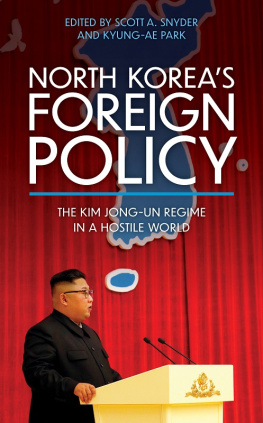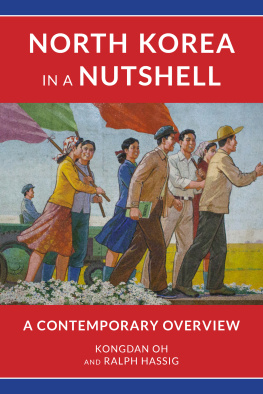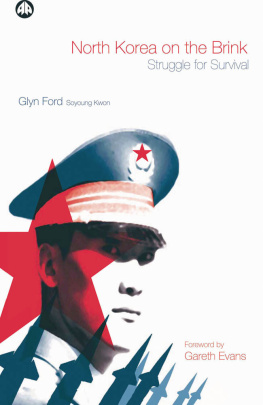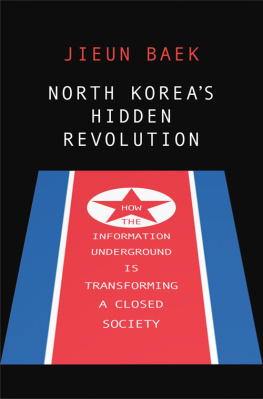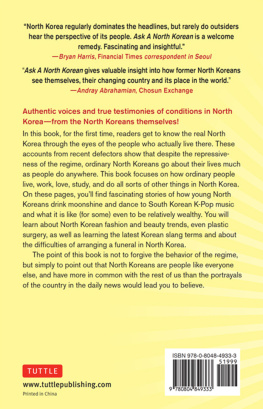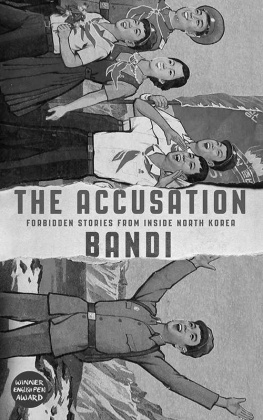The Real North Korea
The Real North Korea
Life and Politics in the Failed Stalinist Utopia
ANDREI LANKOV


Oxford University Press is a department of the University of Oxford. It furthers the Universitys objective of excellence in research, scholarship, and education by publishing worldwide.
Oxford New York
Auckland Cape Town Dar es Salaam Hong Kong Karachi Kuala Lumpur Madrid Melbourne Mexico City Nairobi New Delhi Shanghai Taipei Toronto
With offices in
Argentina Austria Brazil Chile Czech Republic France Greece Guatemala Hungary Italy Japan Poland Portugal Singapore South Korea Switzerland Thailand Turkey Ukraine Vietnam
Oxford is a registered trade mark of Oxford University Press in the UK and certain other countries.
Published in the United States of America by
Oxford University Press
198 Madison Avenue, New York, NY 10016
2013 Andrei Lankov
All rights reserved. No part of this publication may be reproduced, stored in a retrieval system, or transmitted, in any form or by any means, without the prior permission in writing of Oxford University Press, or as expressly permitted by law, by license, or under terms agreed with the appropriate reproduction rights organization. Inquiries concerning reproduction outside the scope of the above should be sent to the Rights Department, Oxford University Press, at the address above.
You must not circulate this work in any other form and you must impose this same condition on any acquirer.
Library of Congress Cataloging-in-Publication Data
Lankov, A. N. (Andrei Nikolaevich)
The real North Korea : life and politics in the failed Stalinist utopia / Andrei Lankov.
pages; cm.
Includes bibliographical references and index.
ISBN 978-0-19-996429-1 (hardback : alk. paper)
1. Korea (North)Politics and government1994
2. Korea (North)Foreign relations. I. Title.
DS935.774.L36 2013
951.9304dc23 2012046992
9 8 7 6 5 4 3 2 1
Printed in the United States of America
on acid-free paper
CONTENTS
The present book would have been impossible without the support and encouragement of many individuals with whom I have discussed the numerous issues dealt with in the book. Among many others, I would like to mention Rdiger Frank, Scott Snyder, John Park, Stephen Haggard, Nicolas Eberstadt, Marcus Noland, Fyodor Tertitsky, Tatiana Gabroussenko, Kim Yng-Il, Kim Sk-hyang, Yu Ho-yl, Nam Song-uk, Yu Kil-chae, Kim Byng-yn, and Zhu Feng.
I am especially grateful to Peter Ward, who typed most of the manuscript while correcting my less than perfect English and also providing me with advice on both style and subject matter, as well as with valuable critiques of my ideas and arguments.
When it deals with the issues of the recent social and economic developments, the book draws on the result of the research that was supported by a grant from the National Research Foundation of Korea (NRF-2010-330-B00187). I also would like to express my deep gratitude to Moravius who allowed me to use some photos from his extensive collection.
What does the average Westerner think when North Korea is mentioned? In all probability a number of oft-repeated phrases straight from the media will spring to mind. A mad country, the worlds last Stalinist regime, nuclear brinkmanship, and other similar clichs dominate popular understanding of North Korea. Above all, North Korea is said to be irrational. This is, allegedly, a country whose actions are unpredictable, defying common sense and perhaps even the laws of physics.
But there is one problem with these clichs: they are largely wrong. North Korea is not irrational, and nothing shows this better than its continuing survival against all odds. North Korea is essentially a political living fossil, a relic of an era long gone. Similar regimes either changed out of recognition or disappeared long ago and are now remembered with disdain, if at all. Meanwhile, the regime in Pyongyang still remains in full control of its country. This is a remarkable feat, especially if we take into consideration that it has to operate in a highlyand increasinglyunfavorable environment.
North Korea is a small country with few resources and a moribund economy. In spite of all this, however, it has managed to survive and successfully manipulate larger players, including an impressive number of the great powers. You simply cannot achieve this by being irrational. North Koreas alleged penchant for irrational and erratic behavior is illusionary: the North Korean leaders actually know perfectly well what they are doing. They are neither madmen nor ideological zealots, but rather remarkably efficient and cold-minded calculators, perhaps the best practitioners of Machiavellian politics that can be found in the modern world.
And what of other descriptions: Is North Korea really driven by an insane ideological zeal? Is it unpredictably aggressive? Indeed, the grotesquely bellicose and often nonsensical rhetoric of the North Korean official media and the countrys occasional armed provocations and nuclear weapons program might seem like a confirmation of its alleged aggressiveness. However, a deeper look into Pyongyangs decision making should make us skeptical of such claims. Pyongyangs brinkmanship indeed appears risky at times, but so far North Koreas leaders have known where to stop, how not to cross the red line, and how not to provoke an escalation of tensions into a full-scale war. They have employed saber rattling for decades as part of a shrewd (and highly rational) manipulative strategy that has succeededin most cases, at least.
This book is, first of all, about the inner logic of North Korean behavior. This logic is defined by the peculiarities of North Korean society, which in turn are the results of long-term developments. I have written this book in order to explain how North Korea has come to be an international problem, and I also attempt to explain why North Koreas leadership has had no option but to try to remain a pariah.
The book starts with a sketch of North Korean history, which is important since familiarity with the history of the North is vital for anybody who wants to understand the current predicament facing the North Korean leadership. The Kim family regime began as a bold experiment in social engineering. This experiment was led by the elite, whose efforts were much encouragedand often directly controlledby Stalins Russia, but they also enjoyed considerable support from below.
However, the initial rosy expectations and popular enthusiasm were sadly misplaced and soon North Korean society found itself saddled with an increasingly inefficient and unsustainable economic model that had become dependent on the constant infusion of foreign aid. Matters were made worse by the nature of the North Korean elite, which had become hereditary and almost impossible to challenge or change. As time passed and with no apparent way out of the predicament, the economic and political position of North Korea changed from acceptable to difficult before becoming disastrous.
Sadly and strangely, the major problems faced by North Koreas decision makers were created by the staggering economic success of North Koreas twin statethe Republic of Korea. Even though it was impossible to know in 1945, South Korea chose a path that, at the end of the day, proved to be far more efficient and promising than the choices made by (or partially forced on) North Koreas decision makers. However, the existence of the highly successful South Korean state has created continuous and nearly insurmountable problems for the North Korean elite.
Next page


